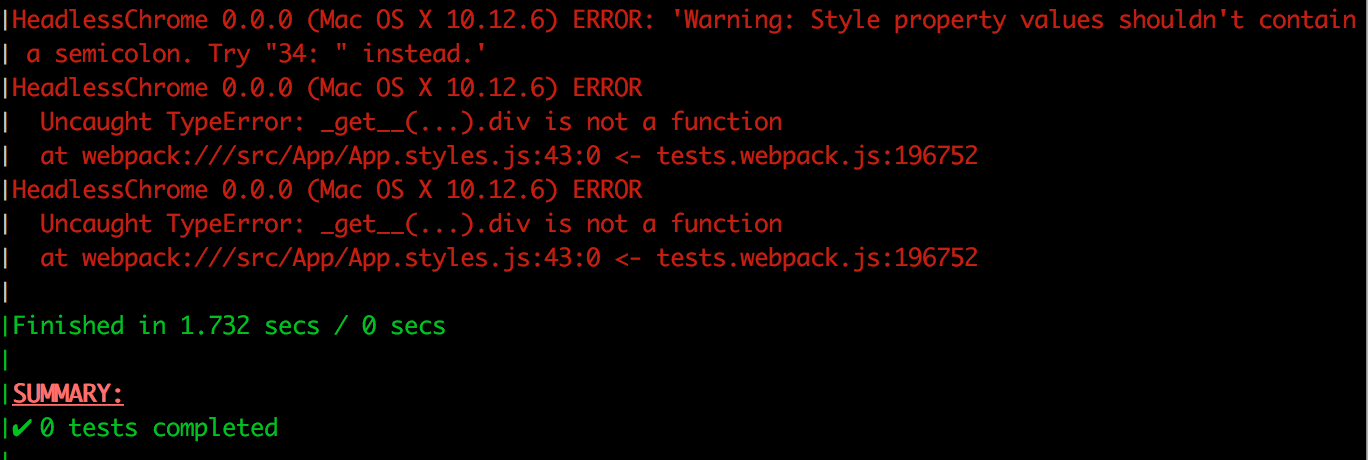emotion-enzyme-mock
A stack for testing React components is
- Karma - Test runner
- Mocha - Test framework
- Chai - Assertion library
- Sinon - Mock Library
- Enzyme - Test renderer for React components
When running tests in the above stack and using emotion for CSS-in-JS, karma will fail to run, throwing errors. Presumably somewhere in the test stack, whether when using karma-webpack, or when enzyme renders components using react-test-renderer, the Emotion classes do not get generated or parsed correctly.

This mock library will mock css and styled functions from Emotion so that tests pass. This is written fairly naively using tagged template literals, but seems to work without issue.
Installation
Using npm
npm i emotion-enzyme-mock -D
Using yarn
yarn add emotion-enzyme-mock -D
Usage
emotion-enzyme-mock has a main umd bundle for usage with webpack.
Webpack
Add emotion and react-emotion to the noParse key to prevent webpack from including the real libraries in the tests.
module: {
noParse: [
/node_modules\/emotion\//,
/node_modules\/react-emotion\//
]
Then add aliases that point to this mock library in node_modules for emotion and react-emotion in the resolve config.
resolve: {
alias: {
'emotion': 'emotion-enzyme-mock',
'react-emotion': 'emotion-enzyme-mock'
}
}
This will mock the imports when loading with karma-webpack.
Assertions
When using the css function, the mock returns a string (uuid) for the className. Import the style and assert its existence via a CSS selector in the enzyme assertions (example using chai-enzyme).
import Component, { container } from './Component';
...
const wrapper = mount(<Component />);
expect(wrapper)
.to.have.exactly(1).descendants(`.${container}`);
When using a styled function, the mock returns a React component. Import the component and assert its existence directly.
import Component, { Title } from './Component';
...
const wrapper = shallow(<Component />);
expect(wrapper)
.to.have.exactly(1).descendants(Title);
This method works using Enzyme's shallow and mount methods.
When using enzyme.render, the component tree is rendered out to a static HTML string, so asserting the existence of a component returned from styled directly will fail. The mock adds a className property to the component that may be used to verify its existence.
import Component, { Title } from './Component';
...
const wrapper = render(<Component />);
expect(wrapper)
.to.have.exactly(1).descendants(Title().props.className);
API
This library caches generated strings that may be tested against. Due to the nature of tagged template literals, it is necessary to specify the expected output style string in the tests.
Import the getStyle function to compare strings.
It is recommended to use chai-string to compare the results with expected results to make ignoring indentation easier.
When using the css tag function
import { getStyle } from 'emotion-enzyme-mock';
import Component, { container } from './Component';
...
const expectedContainer = `
background-color: #efefef;
margin: 0 auto;
max-width: 75vw;
`;
expect(getStyle(container))
.to.equalIgnoreSpaces(expectedContainer);
When using the styled tag functions
import { getStyle } from 'emotion-enzyme-mock';
import Component, { Title } from './Component';
...
const expectedContainer = `
background-color: #efefef;
margin: 0 auto;
max-width: 75vw;
`;
expect(getStyle(Title()))
.to.equalIgnoreSpaces(expectedContainer);
composes
When using composes to compose styles, use .containIgnoreSpaces() from chai-string because the tag function will add a new rule to the result
composes: 4da1319d-1ffe-422d-b94e-f918e4dda062;
Future/TODOs
- Make
getStyleaccept a component from astyledtag function without having to call the function, while still accepting acsstag function result. - emotion apis other than
cssandstyledare no-ops. There may be desired tests around these. - Currently targeted to the specific test stack outlined above. Could be made to work with jsdom or jest.
- Make real utilities for testing emotion with enzyme instead of naive mocks. Something along the lines of jest-styled-components
- Add a chai assertion plugin a la jest-styled-components-matcher